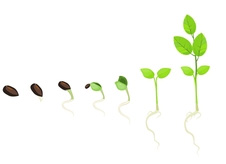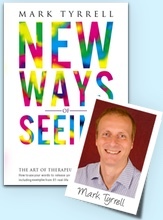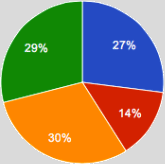
“I beg your pardon
I never promised you a rose garden
Along with the sunshine
There’s gotta be a little rain sometime”
—from ‘Rose Garden’ by Joe South
“When life takes you for a ride, hang on tight!”
—Charles Schulz, author of ‘Peanuts’
Challenges are an inevitable part of life, from the first breath we take right through to the last.
All lives follow twists and turns, dark paths as well as lighter ones.
But some common life stages pose greater risks to mental health than others, and we all go through them – at least, if we’re lucky! Often it is at times when we face change, such as illness, divorce, or even retirement, that we suddenly find it harder to meet our needs – and those are the times we are most at risk of becoming depressed.
Prefer to watch instead?
So here I want to share with you some of the common life events that increase the risk of depression, and why that might happen, so that you can use this to help prepare clients (and yourself and your loved ones) for tough times. It’s so important, because depression is all around us. It’s a ‘disease of civilization’ and a curse of modern living.
We live in depressing times
When pressures and demands prevent people from meeting important needs in their life, they naturally feel stressed. And, in turn, when people reach a point of feeling helpless to meet those needs, they can start to feel trapped. Mulling over unmet needs can stress the brain and eventually produce what we call clinical depression.
Depression is a growing problem in modern life. Its prevalence now is ten times greater than 70 years ago. A rise that apparently accounts for increased diagnosis and people being more ready to admit they are depressed. So there does seem to be a huge actual increase in incidence.
Depression is striking young people more and more(1), but no age group is immune: depression is rising in all age groups, as are suicide rates (2). And we can’t simply pass the disorder off as a ‘chemical imbalance’ – our genetics just don’t evolve that fast.
Human beings suffer in context. They suffer in the context of their current situation, but also in the context of their emotional history and learning, and their innate character traits.
Relationships probably have as much to tell us as other life contexts about why some people depress and others don’t.
What’s more, attitudes, feelings and ways of responding to life can all be learned from other people, so the more depressed people there are, the easier it is for depression to spread through communities.
Please (don’t) pass it on
Some people learn depressive attitudes from others. Living with a depressed person is, unsurprisingly, a risk factor for becoming depressed (3). Again, this is strong evidence that there is more than just genetics at play here.
Many psychologists, including Michael Yapko and Martin Seligman, consider depression to be partly a learned phenomenon, and also a ‘socially infectious’ one. Seligman found that children learn depressive biases, expectations and world views from their primary caregiver. He also found that if children were taught new ways of responding to their day-to-day realities, depression could be avoided. Nicholas Christakis and others have shown that depression can spread in social networks up to three degrees of separation, an effect that appears to be more pronounced in women.
Clearly, there are multiple different causes of depression – not just one simple blanket explanation. But it’s not just who you know, or even what happens to you, that determines whether you will become depressed or not.
No one chooses depression
Some people react to the idea that depression isn’t primarily a biological disease with a knee-jerk response like “Are you saying it’s people’s own fault that they become depressed?” As if it’s nothing to do with a person’s emotional history and learning! They interpret the idea to mean that depression is somehow a choice a person makes, or a reflection of personal weakness.
But of course, the truth is far more subtle than that. A small proportion of people do perhaps have a genetic predisposition to reacting to life’s events with greater stress and, of course, no one wants to be depressed. Strong, intelligent, good people become depressed. And sometimes life can be overwhelming for anyone. But it’s important to consider the following:
Depression isn’t solely an event-driven phenomenon
People can and do have all kinds of terrible things happen to them without depressing, while other people seem to become depressed even when outwardly their lives seem to be perfectly fine. So it’s not just about what happens to a person so much as what they inwardly do with what happens to them – how they respond and whether they are prone to negative rumination.
Negative rumination or mulling can happen even during periods of stability and calm. While outwardly life may be calm, inwardly anxiety may be churning. Conversely, a person’s life may be outwardly harsh, but inwardly they may be calm and hopeful.
Resilience can be learned and developed. If someone has been traumatized or spent years listening to someone else interpret life depressingly, then it is not their fault. If life becomes incredibly overwhelming, that is not their fault either.
But there do seem to be times in a person’s life, often times of transition, when it becomes harder to meet their emotional needs. This leaves them vulnerable, and potentially more prone to depression. But it’s feelings of helplessness and hopelessness about ever meeting those needs again that allow depression to really set in.
If someone has learned depressive attitudes, had traumatic emotional conditioning or not been exposed to enough reasonable challenge in childhood, these periods in life may pose a greater risk.
Here I want to give you some ideas as to what stages of life generally tend to be risky for people’s emotional health and balance. Understanding this is more important than ever against the backdrop of the ever-increasing spectrum of depression in our modern world.
More children are depressed than ever before. Yes, this may have something to do with overdiagnosis and eagerness to pathologize natural sadness. But it is true that more children seem to be genuinely disturbed. So what are the risky times in childhood?
Childhood changes

Potentially difficult experiences for a child include:
- Going to a new school, particularly before they establish new friendships
- Moving away from familiarity
- Being bullied
- Death of a family member or pet
- Loss of a parent through divorce, especially if that parent becomes estranged
- Arguing or abusive parents
- Too much time spent in a virtual world online, so that the real world can start to feel unnegotiable, and relationship skills may not have developed
- Illness of a parent, friend or self.
None of these events inevitably produce depression of course, but they are risky times. I should point out here that there is actually evidence to suggest that some adversity as a child, as long as the child doesn’t feel entirely helpless, can actually strengthen mental resilience.
It’s important to support the child, help them meet their primal emotional needs in any way we can (perhaps outside of school), and help them relax, have fun, find what they enjoy to do and help them explain events to themselves in ways that are not depressing.
And it goes without saying that children need love and support. But of course, that doesn’t just apply to children.
Teenage transitions

The idea of the ‘teenager’ is relatively new, and it may be that many young adults have never quite become comfortable with that ‘in-between’ identity – not quite being an adult, but not being a child either.
Anxieties around forming more adult relationships, sexual awakening, pressures of conforming or finding an identity through seemingly not conforming, concerns about what path to take in life, pressures over drugs and sex, and hormonal and other physical changes can all lead to increased rumination, stress and anxiety.
Conflict with parents can also lead to inner struggles and fears.
Teenagers may feel particularly vulnerable due to:
- Changing schools
- Developing ‘hopeless’ crushes
- Relationship issues, including breakups
- Leaving school or college
- Going away to university and suddenly facing pressure to actively meet emotional needs, such as form new friendships
- Separation or divorce of parents
- Bereavement.
Addictive behaviours such as drug or alcohol consumption, smoking, or self-harm such as cutting may start during teenage years and may persist as a misguided coping mechanism if not superseded by healthier ways to meet needs.
Treating teenagers as young adults, helping them develop responsibilities and deal with the complexities of life, and actively teaching them emotional skills by re-evaluating explanatory styles, understanding their and other people’s primal emotional needs, and even helping them examine their expectations from life, can all be really powerful ways of supporting teenagers through difficulty.
But of course, teenagers don’t stay teenagers forever.
Adulthood anxieties

Pressures for young adults include:
- Starting a new job (or not)
- Settling into a relationship (or not)
- Moving away from the family home (or not).
These issues can all pose problems for the young adult. It’s really important to realize that not experiencing hoped-for transitions can be just as much of a problem for young adults as the transitions themselves. Romantic and career successes may prove harder to achieve than they had hoped or anticipated.
New responsibilities can also be trying for some young adults. One young guy I saw told me he felt terrified at the prospect of paying bills. Another woman in her twenties told me she was starting to despair that ‘time was running out’ because she had always imagined that ‘Prince Charming’ would have swept her off her feet by now.
A young person may go through several relationships as they try to find out who they are and who they are compatible with, so relationship issues may present difficulties.
Career choice and advancement and the acquisition of material wealth and ‘success’ – whatever that means! – may also be a major focus during young adulthood as we start off in pursuit of the ‘American Dream’. Mind you, as hard as we may try to plan the perfect future, sometimes life has other plans.
Parenting panic

The impact – no, let’s be honest – shock of having a newborn baby is often beyond anything we could have imagined or anticipated.
Don’t get me wrong, new parenthood is, or can be, wonderful. But that doesn’t mean it doesn’t come with its fair share of stress. Challenges for new parents include:
- The sudden realization of serious responsibility. Many people develop fears they didn’t have before, such as of flying, because now they have to be around for their baby
- Perfectionistic demands on themselves or even their baby, which clash painfully with reality. They may blame themselves for feeling angry or resentful, sometimes needing reassurance that they are only human
- The physical and emotional stress of a difficult birth, which can lead to PTSD and can in turn precipitate depression in some people
- Difficulty meeting their needs for rest, adult social connection and financial security, especially for single parents
- Worries or preoccupations with the baby’s health
- Strain on relationships brought on by stress and lack of sleep
- Inability to strike the right work/life balance and overworking if parents are working as well as parenting.
I realise this all sounds a little bleak! Of course, many parents are thrilled by the arrival of a newborn, and indeed, raising a child can bring incredible joy… but that’s not what this article is about. The reality is, many parents do find this stage very challenging.
But it can be just as challenging when the expected transition to parenthood doesn’t happen. Many people have dreamed of having children for many years, and finding out that this may not be possible can trigger people to ruminate and become overwhelmed, sometimes to the point of feeling that life is not worthwhile.
But time moves on, and new challenges emerge.
Middle-age milestones

Challenges for people in their forties and fifties include:
- Awareness of dreams not fulfilled
- Job insecurity or stress, or work becoming more intermittent
- Concerns about children or aging parents
- Family or relationship breakdown or job loss, potentially making people feel as if they have to ‘start all over again’ as a single or unemployed forty- or fifty-something. That feeling can be terrifying and overwhelming
- Realizing that their time is finite – the so-called ‘mid-life crisis’ can make people want to cling to a sense of youth or adventure
- Health issues and poor physical health, especially if a person hasn’t prioritized looking after themselves or has struggled with long-term stress.
Forty has been called the ‘old age of youth’ and fifty the ‘youth of old age’. Not that old age is necessarily a bad thing! In fact, some people report being happier than ever in their senior years. But old age is certainly not without its own trials and tribulations.
Old age and retirement

Work shouldn’t meet all of a person’s needs, but it may well meet some important ones. When a person retires from work they might suddenly find some of those needs remain unmet. Specific challenges for retirees and the elderly may include:
- Unfulfilled needs for status, meaning, and purpose
- Loss of the sense of belonging to a community
- Lack of self-esteem and self-advancement, as they are no longer able to feel competent in their role or stretch themselves by updating their skills
- Increased frailty, illness, and waning physical and sometimes mental health, both personal and of their partner and friends
- Loneliness from friends dying or moving away
- Feelings of isolation and marginalization due to negative attitudes towards the elderly
- Worry about ‘becoming a burden’ as uncertainty over their health and care develops
- Conflict with a partner from suddenly spending much more time with them than ever before.
Going from a context that easily meets many emotional needs to one that doesn’t can cause a person to ruminate, stress and, unless they find ways to meet those needs outside of the work context, become depressed. Less human contact can be a major problem and keeping connections going may be as vital for health as regular exercise.
It’s not what we experience, it’s how we experience it
So some issues are pretty perennial such as relationship concerns, health worries (although typically they increase with age) and money worries. Trauma can occur at any stage of the life cycle, of course, and there’s no predicting when the stresses of life will suddenly mount up to the point of feeling overwhelming.
We all go through tough times, but it’s not just what we go through that determines our ability to cope, but how we deal with the stress – how we still manage to meet our needs as best we can, retain hope, and feel empowered. Once we understand the typical stresses of the life cycle, we can prepare ourselves and others to best manage them. And a big part of this lies in having good support from others.
So what can we learn in general? Well, first and foremost, relationships matter. Having warm, good and wide-ranging friendships and relationships helps us all mentally, physically and even financially.
The one and only constant in life is change. The body morphs, circumstances alter, no new second is the same as the last. Resilience means flowing with the changes, not fighting them. Adaptability is perhaps the greatest human asset. And of course, everything passes, including hardships.
Let me leave you with some words from ex-slave and self-created man George Washington Carver:
“How far you go in life depends on your being tender with the young, compassionate with the aged, sympathetic with the striving and tolerant of the weak and strong. Because someday in your life you will have been all of these.”
Our How to Lift Depression Fast course enables you to treat depression quickly, making a lasting difference in your clients’ lives without the use of harmful drugs. Read more about the course here.
Notes:
(1) http://www.theguardian.com/healthcare-network/2015/sep/01/childhood-depression-rise-wary-misdiagnosis. For recommendations regarding use of antidepressants, see: http://www.antidepressantsfacts.com/1995-12-Antonuccio-therapy-vs-med.htm)
(2) UNICEF (1993). The Progress of Nations. United Nations, 45.










